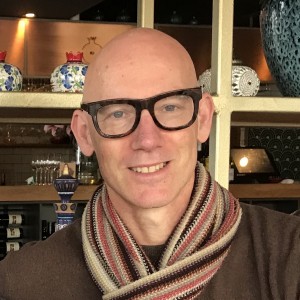 In July, the department welcomed a new faculty member, Dirk Moses, the Frank Porter Graham Distinguished Professor of Global Human Rights History. Hailing most recently from Sydney, Australia, Professor Moses completed his graduate work in Scotland and the United States and previously taught at the European University Institute in Florence, Italy. Not surprisingly given his international experience, Moses engages in globally minded scholarship and teaching. Since publishing his first book, Moses has edited and coedited ten anthologies while editing the Journal of Genocide Research since 2011.
In July, the department welcomed a new faculty member, Dirk Moses, the Frank Porter Graham Distinguished Professor of Global Human Rights History. Hailing most recently from Sydney, Australia, Professor Moses completed his graduate work in Scotland and the United States and previously taught at the European University Institute in Florence, Italy. Not surprisingly given his international experience, Moses engages in globally minded scholarship and teaching. Since publishing his first book, Moses has edited and coedited ten anthologies while editing the Journal of Genocide Research since 2011.
Although Professor Moses trained in modern German history, his research has always maintained global scope. Shortly after completing his PhD at UC Berkeley, he organized an anthology on Australian settler colonialism and genocide, and then initiated multiple works on colonialism, genocide, and intellectual history. While publishing these international histories, Moses finished his first book, German Intellectuals and the Nazi Past (Cambridge University Press, 2007), which examined West German public intellectual debates about the legacy of democracy’s failure in 1933 and the Holocaust. His forthcoming book, slated for publication by Cambridge University press in January 2021, combines his interest in intellectual history and in mass violence. The Problems of Genocide: Permanent Security and the Language of Transgression shows how the concept of genocide has historically dominated popular attention and debate about mass violence against civilians, in effect detracting attention from systematic violence perpetuated by governments against civilians. International law, he argues, allows governments to cloak certain form of violence in the vocabulary of “security” while distinguishing more destabilizing violent acts as “genocide,” to the detriment of human rights.
Several months after arriving in Chapel Hill, Professor Moses sat down for an interview to discuss his work and his excitement about joining the UNC History Department. Extracts are reproduced below.
What attracted you to UNC?
A great attraction of UNC History is its renowned graduate program. It has produced generations of outstanding historians who, like their UNC mentors, have gone on to shape fields. Also attractive is the rich research culture at UNC and in its environs. This culture is enabled by the ecosystem of centers, institutes, and research clusters that invite outside speakers, organize workshops and conferences, and so forth. Writing prize-winning and field-defining books may be a solitary undertaking, but the creativity, inspiration, and doggedness necessary to conceptualize and finish large projects feeds off the intellectual energy of this environment. This is what makes UNC a world-class research institution.
Can you say a few words about teaching at UNC?
I’ve found attractive the extent of small group teaching in the department—many graduate and undergraduate students benefit from smaller seminars. This means students are more active in class preparation by reading texts for group discussion, and they receive more personalized attention than in the very large lecture classes I taught in my previous job. I’ve been impressed by students’ energetic engagement with the demanding readings and issues they raise in my current classes on humanitarianism and political systems and social security in twentieth century Europe and the United States.
Can you tell our readers about moving across the world in the midst of a pandemic?
I was fortunate in several respects. First, with Australian borders tightly shut—not even citizens are permitted to travel abroad—I had to secure an emergency visa just to leave the country as well as a travel exemption. Then, I had to ship all my things months in advance of the move. Second, because Australia was able to establish relative control over the spread of the virus, I was able to leave without much fear of contracting the disease. Third, the pleasant community in Chapel Hill and Carrboro as well as the staff and faculty in the department made the relocation relatively painless. I’m delighted to be here.
